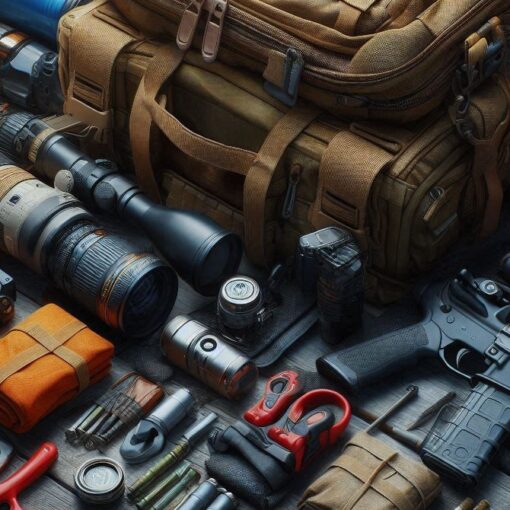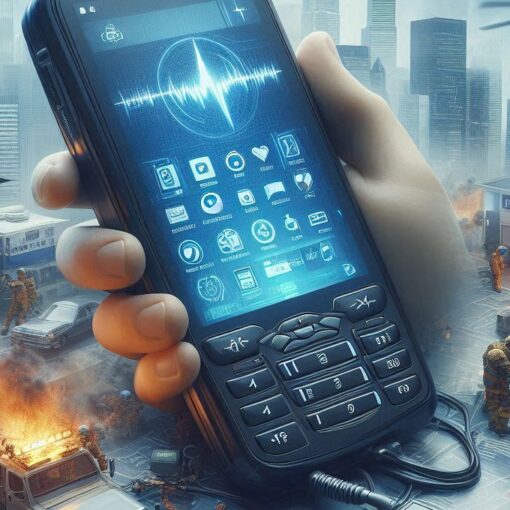Top Takeaways and Key Concepts
- Pack lightweight essentials to reduce fatigue and move efficiently during outdoor travel.
- Carry a portable water filter to ensure safe drinking water in any environment.
- Use compact cooking gear to prepare meals quickly without adding heavy weight.
- Keep a first aid kit ready to treat injuries and prevent emergencies from escalating.
- Bring navigation and shelter tools to stay safe, find direction, and protect yourself outdoors.
Summary of This Article
This article explains how smart packing and proper gear make outdoor travel safer, easier, and more enjoyable. It emphasizes choosing lightweight gear, sturdy footwear, and essential items like water filters, snacks, and weather protection. It also highlights the importance of staying organized, picking the right backpack, and preparing for emergencies with first aid kits, navigation tools, and shelter solutions. The main message: pack smart, stay prepared, and enjoy the adventure with confidence.
Short Video Version of this Article
Things can get hard while you’re on the go, especially if you’re trekking or running away from something scary. When you’re outside in nature, it can feel like you’re in a movie that moves quickly. It’s really important to have the correct gear.
Please Note: This post may contain affiliate links. If you click one of them, we may receive a commission at no extra cost to you. As an Amazon Associate, I earn from qualifying purchases.
I’ve been there, tripping over my backpack that felt like it weighed a ton. It’s not enough to just look good in your clothes. You want to be safe and have the trip go more smoothly. Get some strong sneakers. Believe me, your feet will be grateful after a long walk. When your toes don’t hurt, a nice pair can feel like magic. You also need water bottles. It’s the worst sensation in the world to be thirsty and not see a drink.
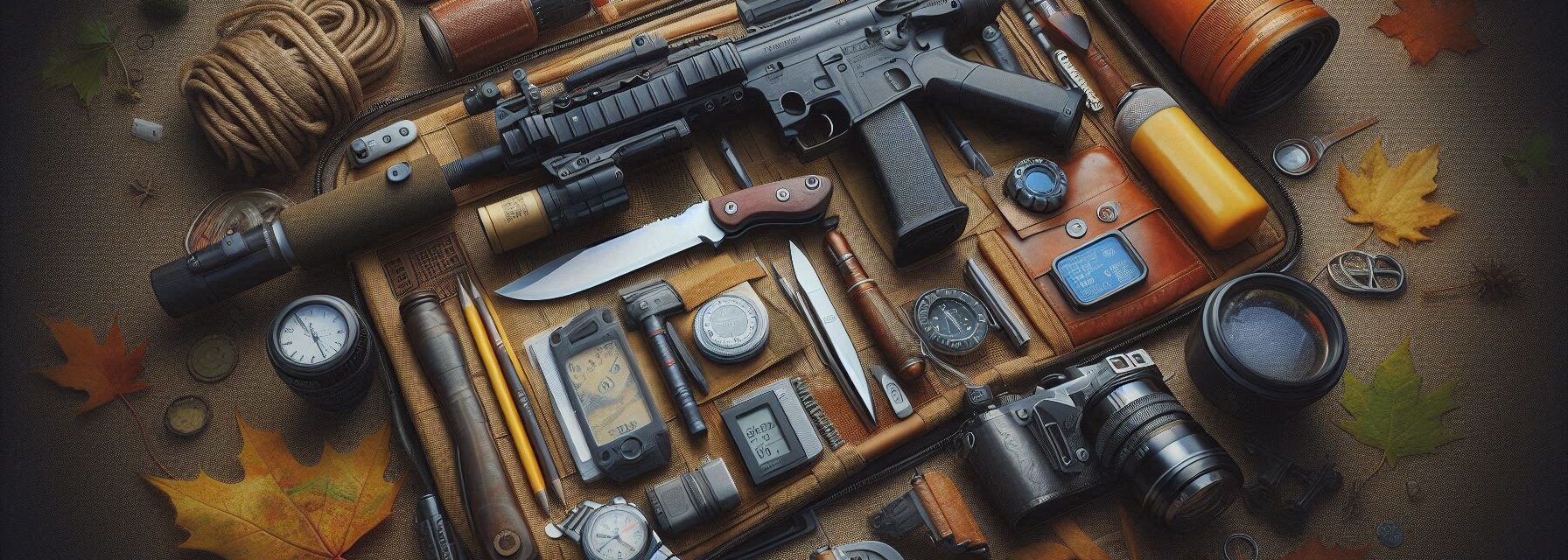
It’s prudent to have snacks. You can get a jolt from energy bars, trail mix, or even chocolate. It felt like the longest trek ever when I ran out of snacks on a hike.
It may sound monotonous to pack a first-aid kit, but it might save your life. Do you need band-aids for cuts or scrapes? Very important. A little attention goes a long way.
Also, get ready for adjustments. The weather may be crazy. It can go from a beautiful morning to a rainstorm in a flash. A light jacket or poncho fits well in your backpack and can help you out should the skies decide to pour.
It also helps a lot to stay organized. Make it easy to find things! It’s not fun to have to go through a messy bag when you need something right away. It also helps you think clearly.
I’ve learnt that being ready can truly change the game through all of my trips. It keeps you safe, and to be honest, it makes everything more fun. Let’s pack smart, have some fun, and make some memories while we’re at it!
Choosing the Right Backpack
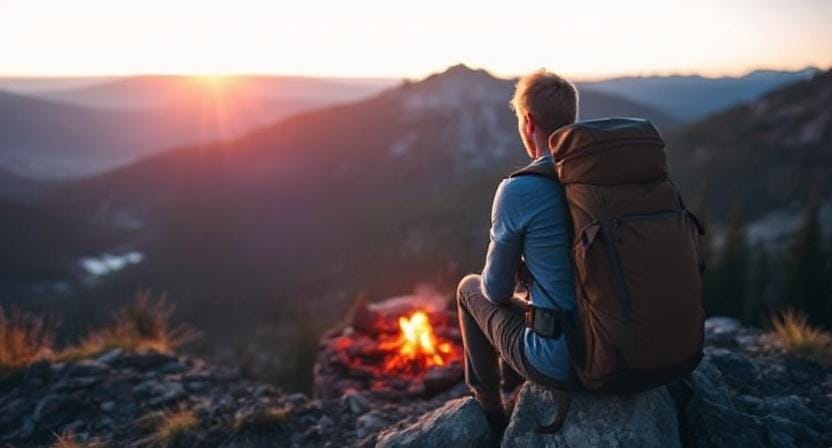
First things first: when you’re on the run, your bag is your lifeline. It’s where you’ll keep everything from food and water to tools and first aid supplies.
But how can you pick the one that’s best for you? I recall my first long hike. I had a huge load on my back that felt like a boulder. Look for a pack that fits properly and spreads the weight equally because comfort is important.
When you pack, think about how much space you really need. A tiny daypack is great if you’re only heading out for the day. You won’t feel like a pack mule, and it keeps things light. You just need to get some food, water, and maybe a light jacket. No problem!
If you’re going to be gone for a long time, like hiking for days, or if anything crazy happens and you need to leave, you’ll want a heavier bag. One that has a number of pockets. It really makes a tremendous difference. You can keep your things in order. Instead of a treasure quest, it’s easy to find your flashlight or that tasty snack.
It’s also very crucial to pay attention to what your bag is constructed of. Find something that is tough and won’t get wet. You never know what a wet day will bring. I know this from experience. When you go for your granola bar and find it all mushy because it rained, that’s the worst. Yuck!
Your things will be safe in a sturdy bag. Your stuff won’t be ruined by those unplanned river crossings. Also, it feels good to know that everything is safe.
So, whether you’re going to the park for the day or on an epic journey, think about what you truly need. Pack wisely, keep everything in order, and have fun on the trip!
Water Filtration Systems

You need water to live, but while you’re on the go, it can be hard to obtain safe drinking water. This is when portable water filters come in handy! I’ve used different filters when camping and trekking. They are light and do a good job of getting rid of dirt and other things that can make water unsafe.
There are several ways to get drinking water while traveling, you know. You can use pump filters, gravity filters, or even straw-style filters that enable you drink straight from streams or lakes. That’s pretty cool, right?
There are benefits to each style. Pump filters are useful for one person or a small group since they are simple to use. Just fill it up and drink! Gravity filters are great for groups of people. They can filter a lot of water at once with very little effort. You just set it up, and it does its magic. Very useful, especially when everyone is thirsty.
But here’s an idea. What do you do if your primary system stops working? Or if you run out of things? That’s when backup plans come in handy. Having some drops or tablets to clean yourself with in your luggage can really help. They don’t take up much room. Put one in a bottle of water, wait a little while, and you’re good to go!
It’s like having a safety net. Having such medications makes you feel good within. You don’t have to worry about clean water; you can just enjoy your trip.
So, if you’re drinking from a river or using a filter, be sure you have a backup plan. Stay cautious and drink plenty of water!
Lightweight Cooking Gear
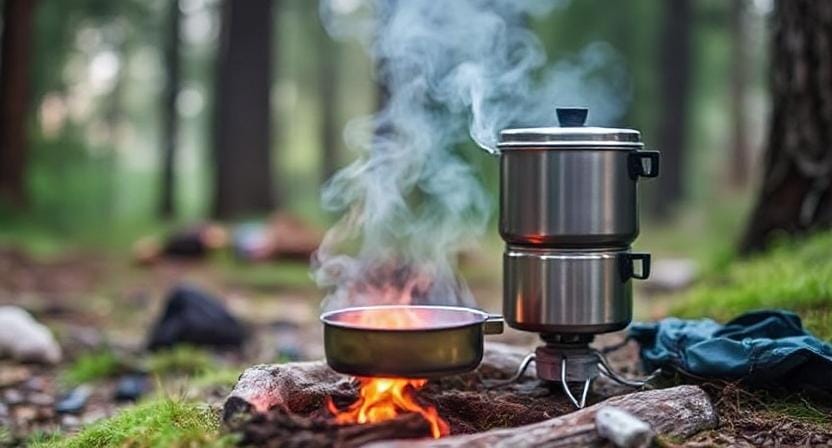
It doesn’t have to be hard to cook on the go! Having light cooking tools makes it quick and easy to get ready for meals. I like using small camping stoves that run on propane or butane because they heat up food quickly and don’t take up much room in my bag.
You know, having the correct pots and pans when you’re camping can really help. Think of those sets of cookware that fit within each other. They are great for camping! Pots and pans that fit within each other? Brilliant! You have everything you need to make delicious meals, and you save a lot of space in your backpack.
Let’s talk about tools for a minute. You might chuckle, but have you ever used a spork? You know, the fork and spoon that are the same thing. It seems goofy at first, but it’s very useful! You can stab your pasta or scoop your soup. It serves two purposes, which is great when you don’t have a lot of room.
Also, don’t forget about containers that can be used again. They work great for keeping food fresh. Think about how great it would be to make a big pasta meal and then eat it the next day! No one hates to throw out food, especially when they’re on a lengthy vacation and have to ration it.
So, if you pack properly, you can really enjoy your time outside. It makes getting ready for meals easier and allows you focus on the pleasant things. Imagine how pleasant it will be to relax around the campfire with a warm lunch and tell stories instead of worrying about cooking. Have fun with those dinners!
First Aid Kits
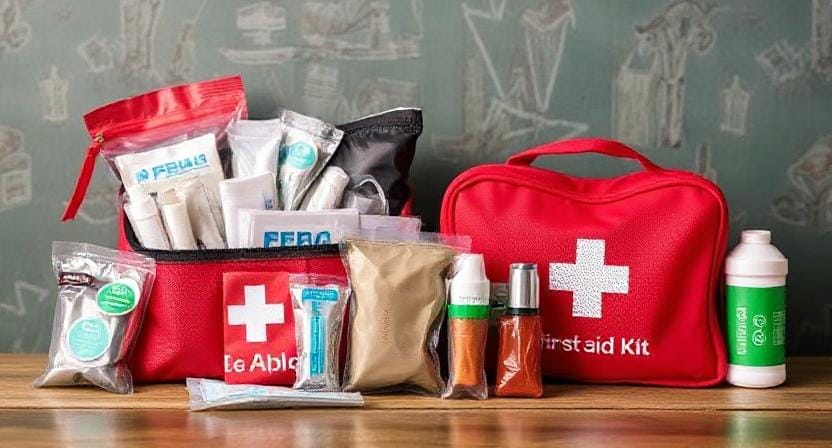
Accidents happen, especially when you’re outside, but a well-stocked first aid bag may help you deal with injuries until help arrives. I’ve even had times when scratches turned into great stories because we were ready!
It’s really vital to have a solid first aid kit when you’re camping. Imagine this: you’re out trekking and someone falls. Ouch! That’s why you should have things like gauze pads, antiseptic wipes, and band-aids. They help with cuts and bruises. It’s also a good idea to have painkillers like ibuprofen. That small medication can really help!
You also need tweezers. It’s normal for splinters to happen, right? A splinter can ruin your s’mores, which isn’t fun. And don’t forget to bring your own medicine! Make sure you put in anything unique you need.
If you live in an area where snakes might be, you should think about getting a snake bite kit. Just in case, it’s better to be safe.
Having everything is not enough; you also need to know how to use it. So, take some time to learn about first aid before you go. You could view a short video or two. Believe me, it might definitely help when things get hard.
Being ready lets you concentrate on having fun. More time for stories, jokes, and, of course, those tasty marshmallows!
Navigation Tools
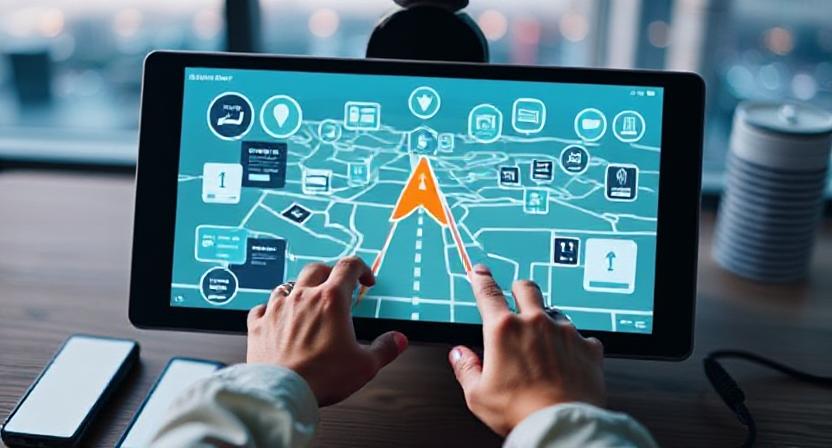
I know how it feels to get lost; it’s not fun! That’s why it’s important to have good navigation tools whether you’re going off the grid or to a new place. Smartphones these days include GPS, but it’s good not to rely on technology alone because the battery life might run out rapidly!
When you go out exploring, you need to have a map and a compass. No joke. Maps tell you where you are, and when you use a compass with them, you have a far better chance of not getting lost. Plus, figuring out how to read a map may be a fun challenge.
Give it some thought. It’s great to know where you’re headed while you’re exploring new routes, isn’t it? Before your travel, practicing those abilities will make you feel more sure of yourself. You don’t want to be second-guessing yourself while looking for the right place to have a picnic!
Also, handheld GPS gadgets are great. They can keep track of where you’re going, which is very handy while you’re hiking for a long time. You won’t have to ask yourself, “Did we pass that big tree before?” Some have supplementary features, such showing places of interest. That’s really cool!
But keep in mind that technology doesn’t always work. A battery that is dead is not pleasant. That’s why it’s smart to have an old map as a backup.
So, spend some time getting used to how to get around. It can make a new road seem like a thrilling adventure. Also, it is good to know you may explore without being scared. More time for stories and fun, right?
Shelter Solutions
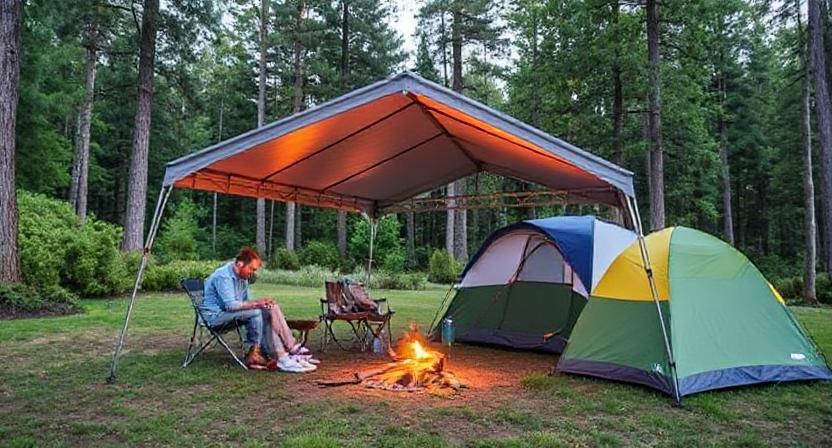
Last but not least, shelter options are quite crucial for both outdoor adventures and emergency situations!
You want gear that fits your comfort and safety needs while keeping the amount of stuff you have to carry around every day to a minimum. This might be anything from tents made for lightweight travel to sleeping bags that are suited for cold weather.
A hammock with a tarp is a huge help for short travels that only last one night. Because it’s so light, it won’t make your bag heavier like a heavy tent would. You merely hang it between two trees, and you’re all set to sleep! Just picture waking up to the sound of birds singing and trees all around you. It’s like an alarm clock in nature.
But it also has a relaxing effect. You can easily see the stars or the sunset from your hammock. So calm, don’t you think? If it starts to rain, don’t forget to put up the tarp. You have to stay dry!
It’s exciting to figure out what you really need for your trip. It’s important to find a balance between weight and what works for you. Everything should have a reason for being there. You have a lot more fun on your trip when you simplify your gear.
Think about the most important things. Do you really need that additional sweater, or could you trade it in for a light sleeping bag that keeps you warm? Every little bit helps. Finding that sweet spot lets you pay less attention to your pack and more to your journey.
It’s all about being comfortable and having fun while you’re out there. So, let’s keep things light and basic.
Featured Snippet: Smart packing keeps outdoor travel safe, efficient, and enjoyable. Essential gear like water filters, navigation tools, shelter, and first aid supplies help you adapt to changing conditions and handle emergencies with confidence. Preparation reduces stress and allows you to focus on the adventure ahead.
Frequently Asked Questions
What are the most important items to pack for outdoor travel?
The most important items include water filtration tools, lightweight shelter, a first aid kit, compact cooking gear, and navigation tools for safety and comfort.
Why should I pack lightweight gear?
Lightweight gear reduces fatigue, improves mobility, and allows you to travel longer distances with less effort and strain.
How do portable water filters help during outdoor trips?
Portable water filters remove harmful contaminants from natural water sources, ensuring safe hydration when clean water isn’t available.
Do I really need a first aid kit for short trips?
Yes, even minor injuries like cuts, blisters, or splinters require basic treatment to prevent infection and discomfort.
What type of backpack is best for hiking or survival travel?
A durable backpack with multiple compartments and a comfortable fit helps organize gear and evenly distribute weight.
Why is navigation gear necessary if I have a smartphone?
Smartphones can lose signal or battery power, so maps, compasses, or handheld GPS devices provide reliable backup navigation.
What are good shelter options for outdoor emergencies?
Lightweight tents, tarps, or hammocks provide quick protection from harsh weather and help conserve energy and body heat overnight.
Suggested Resources:
Survival Cache
https://survivalcache.com
The Prepper Journal
https://theprepperjournal.com
Outdoor Life – Best Camping Gear
https://www.outdoorlife.com/gear/best-camping-gear/

Kevin Collier is a seasoned outdoor enthusiast and writer for Trekbug.com, specializing in outdoor adventures, survival strategies, and prepping insights. With a deep love for nature and a commitment to self-sufficiency, Kevin empowers readers to embrace the wilderness confidently. He shares valuable tips, practical techniques, and inspiring stories, helping both novice and experienced adventurers develop essential skills for surviving and thriving in the great outdoors.



